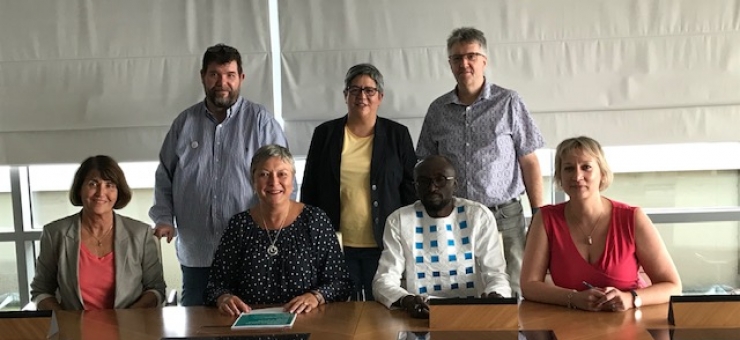News
Orange Group signs groundbreaking global agreement advancing gender equality with protections against discrimination and promoting work-life balance for its 149,000 employees

- Agreement builds on longstanding cooperation between Orange Group and UNI Global Union
- It secures the right to disconnect and flexible working solutions—especially for parents and caregivers
- It establishes domestic violence as a workplace issue
PARIS, 17 July 2019—Orange Group has signed a groundbreaking global agreement today with UNI Global Union that strengthens the telecommunications giant’s commitment to gender equality while empowering workers to enforce the agreement’s principles. The pact covers Oranges 149,000 employees plus contractors and subsidiaries.
Signed in Paris with Orange workers from Africa, and Europe present, the agreement is the first of its kind to recognize that obligations outside of the job, such as the role of primary caregiver, can impede women’s ability to gain employment and to advance in the job.
It squarely places the right to disconnect and access to flexible working solutions as an issue of gender equality.
“The reality is that women perform two-and-a-half-times more unpaid care and household work than men on average, and rather than ignore that fact, this agreement structures a workplace that recognizes women’s experiences and proactively removes discriminatory practices that prevent a truly equitable workplace,” said UNI Deputy General Secretary Alke Boessiger.
“The new agreement is a significant step forward in modernizing and enhancing the rights of Orange workers throughout the world,” Boessiger continued.
Another breakthrough of the agreement is enhanced support for victims of domestic violence. The company and union offer up special work time arrangements, relocation, emergency economic support as examples of accommodation.
One key goal of Orange and UNI is to ensure that women have the same access to jobs throughout the organization—not just clustered in lower-paying support and customer care functions. The agreement provides for gender equality in all roles and in career progression as well as equal pay throughout the Orange group.
“I am delighted that our workplace equality policy is based on ambitious social dialogue, to sustainably reinforce our actions in Group countries to benefit the men and women at Orange”, stated Valérie Le Boulanger, Executive Director of Group Human Resources.
Christine Albanel, Executive Director of Corporate Social Responsibility, Diversity, Partnerships and Philanthropy, continued: “By making our commitment to workplace gender equality a global undertaking, this agreement marks a new milestone in the Group’s social and societal commitment.”
The agreement builds upon a longstanding cooperation between UNI and Orange. A 2006 pact on fundamental labor rights has been instrumental in securing collective bargaining and union rights for thousands of workers throughout Orange’s operations. A 2014 agreement on health and safety has made work safer at the company.
For its implementation, the agreement places a special emphasis on constructive social dialogue and collective bargaining at the local level in order to adapt its content to local circumstances. It also provides for the establishment of local committees on workplace equality, as well as a network of designated workplace equality officers in all larger subsidiaries of Orange.
UNI was represented in negotiations with the company by members of the UNI-Orange Trade Union Alliance, including the alliance president William Ange Coker from SYNAPOSTEL in Côte d’Ivoire; the three French unions CFDT-F3C, CGT-FAPT, and FO-COM; CCOO from Spain; SNTPT from Senegal; SYNATEL from Burkina Faso; as well as the secretary of the Orange European Works Council.
UNI Global Union represents more than 20 million workers from over 150 countries in the fastest growing sectors in the world – skills and services. UNI ICTS represents 3 million workers in the telecoms, tech, and IT sectors. The UNI-Orange Trade Union Alliance is comprised of unions in Europe, Africa, and the Middle East.

